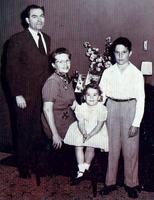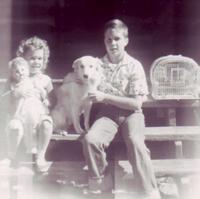As we begin, I'll share a couple of quotes from Annie Dillard's The Writing Life that express so well how I'm feeling about this enterprise.
“Your freedom as a writer is not freedom of expression in the sense of wild blurting; you may not let rip. It is life at its most free, if you are fortunate enough to be able to try it, because you select your materials, invent your task, and pace yourself. In the democracies, you may even write and publish anything you please about any governments or institutions, even if what you write is demonstrably false.
“The obverse of this freedom, of course, is that your work is so meaningless, so fully for yourself alone, and so worthless to the world, that no one except you cares whether you do it well, or ever. You are free to make several thousand close judgment calls a day. Your freedom is a by-product of your days’ triviality…Your manuscript, on which you lavish such care, has no needs or wishes; it knows you not. Nor does anyone need your manuscript; everyone needs shoes more. There are many manuscripts already – worthy ones, most edifying and moving ones, intelligent and powerful ones…Why not shoot yourself, actually, rather than finish one more excellent manuscript on which to gag the world?” (p. 11,12)
“Much has been written about the life of the mind. I find the phrase itself markedly dreamy. The mind of the writer does indeed do something before it dies, and so does its owner, but I would be hard put to call it living. It should surprise no one that the life of the writer – such as it is – is colorless to the point of sensory deprivation. Many writers do little else but sit in small rooms recalling the real world. This explains why so many books describe the author’s childhood. A writer’s childhood may well have been the occasion of his only firsthand experience.” (p. 44)
No one else can tell this story. There are several reasons for that. The most obvious is that I am the only person who lived the story as I saw and felt it. But there are other factors that compel me to tell it. Neither of my parents is still living, but even when they were alive, ours was not a family that told many family stories. We didn’t hear much about our parents’ childhood, and as we grew older, we didn’t hear much about our own childhoods. In my twenties, or maybe thirties, I realized what a void I felt and I bought a “grandmother” book and gave it to my mom one Christmas. I asked her please to fill it with her memories of our family. It was all laid out with questions and brief, doable doses of information requested, but she still refused, saying, “I don’t like to remember the past, I like to look forward.”
Another reason this story is mine to tell is that my brother Chip is seven years older, was a compliant child (I was not), and is a male person (I am not), and therefore experienced our family very differently than I did. My parents were in a very different place, literally and emotionally, when he was little (Europe) and when I was little (West Texas and Arkansas). His memories sometimes coincide with mine, when I ask directly and he’s feeling verbal, but most of the time he follows the family tradition and does not talk much about the past.
My cousins and I grew up in such different parts of the country, they in Nashville, Tennessee and I mostly in Los Angeles, so although we share all the same relatives, we did not have the same relationships with them or memories of them. My cousin Bonnie Kay is a genealogist and archivist by inclination, and I’m grateful that she shares the products of her labors with me, but her history does not feel like mine.
My childhood was largely spent with two sisters who became my sisters as well. The one I was closest to, Marilyn, has been dead now for three years. Her sister Sara, though thirteen days younger than me, born in the same Texas hospital and still my friend, is not a journal keeper or diarist, though she did write articles and speeches quite often in her work as a marriage and family counselor. (She became a full-time fundraiser last year, and I doubt she has any time to write at all these days.) So, although Sara and Marilyn and I shared fifteen of my first twenty years on earth, I am the only one of us three that will tell that part of the story.
And it’s still more than that. I have slowly learned that no one else feels or sees or hears or remembers even one day of this life in the same way as another person does. Each of us has our own unique, passionate and incomplete take on life as we lived it. We’ve all missed events, mistaken comments, avoided facing realities, misunderstood meanings, and misremembered facts as we have created our own memories. They are nevertheless important because they are ours. Because they shaped us. Because they motivated us to act, or refrain from acting, in a million choices down the days. And because, ultimately, they are what we carry with us when we die. It is my conviction that the relationships we have formed and nourished throughout our lives will await us in the next world, the place we call Heaven. Relationships are built upon shared memories. I want to remember it all, as best I can, for my own sake. And if anybody else has the patience to read these words, and if they can benefit anyone in any way, I’ll be glad of it.
From Birth to School
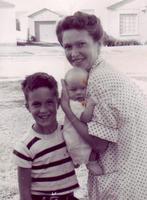
I met a woman in Nashville many years later named Mrs. Mann. She told me, “I drove with your mother to a baby shower in Lubbock when she was pregnant with you and I was pregnant with my daughter, Marita. So you two have known each other since before birth!” That’s one of two stories I know about my mother’s pregnancy with me. The other was told when I asked my mother if she and Daddy ever prayed out loud together, other than at meal time. She answered, “Just once. They were wheeling me into the delivery room and he prayed out loud for me then.” Later on I learned that two years before my birth, my mother had delivered a still-born boy, with the cord wrapped around his neck. They were both probably very frightened that another devastating disappointment could occur at my birth.
I’ve gone back to dusty West Texas just once, for the wedding of Nita Bovarie and Russ DiNapoli. They were students with me in the summer of 1972 in Heidelberg, Germany. They fell in love and decided to be married in Lubbock, her home town, at her parents’ church where I too was on the “Cradle Roll” as an infant. (I still have the certificate.) It was the Broadway Church of Christ, where Norvel Young, my second father, was the preacher while my parents were missionaries in Germany. That church was the chief financial support for the missionary group that followed Otis Gatewood to Germany in 1947.
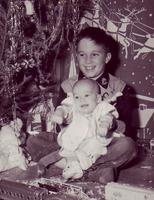
When my parents’ five years in Germany were complete, and they didn’t know what to do next, Brother Paul Sherrod, an elder at the Broadway church, offered my dad a job in his hardware store in Lubbock. That’s how I came to be born there in 1953 (in Lubbock, not in the hardware store). There’s a photograph of me as a baby almost five months old, sitting in my brother’s lap in the hardware store window in front of a Christmas tree and abundant toys. (One of my dad’s jobs there was window dressing.) I remember a tale about my dad’s kneeling in the hardware store and getting a tack stuck in his knee. I’ve been picking up tacks and pins and discarded staples off floors ever since.
At any rate, that hot summer of ‘74 in Lubbock when we witnessed the marriage of Russ and Nita, we spent most of our time in the cool hotel bar, and I had long talks with Russ (a New York actor). He was so put off by the rigid, dull, judgmental, half-dead existence he had thus far witnessed among churchified people. I talked about living in the Spirit and how being a Christian actually makes life the most vibrant it can be. At their wedding I sang (a cappella, because it’s still a Church of Christ) the Beatles’ “In My Life,” which at the age of twenty already meant much to me.
Back to Texas in the ‘Fifties. I have a memory of being in a car with a young woman babysitter, and seeing a tornado twisting towards us. She drove us to a shelter, and there was no tornado damage afterward that I remember. I am not sure if that memory came from Lubbock or Searcy years, because tornadoes were certainly possible in both places.
I don’t recall it, but I do know of another significant event that happened in Lubbock. The story goes that I was on the kitchen counter when the phone rang and my mom turned to answer it. I fell off the counter and broke my collar bone and my leg. I’ve seen a photograph of me trying to ride a tricycle with a huge cast on my leg, but have no remembrance of that. Another sense memory I have could either be Lubbock or Searcy. I wore a thin, synthetic little dress that didn’t close in the back, but just tied at the neck. It was off white with tiny pink flowers, and had little cap sleeves barely there. I remember the feeling of wearing that dress, the texture of the material, and I remember getting old enough to worry about the back not closing. Modesty set in early with me.
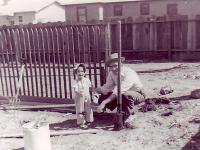 Then came Searcy, Arkansas and more memories pile up. In Searcy, my dad worked for Brother George Benson, the president of Harding College, as his assistant. Many years later I read an article in The New Yorker by William F. Buckley describing his dealings with Benson and other ultra-conservatives who served on the board of a foundation which distributed the wealth of another deceased arch-conservative. I was amazed that my dad had apprenticed with such a character. In his own words, my dad reported that he asked that the position be created because he “wanted to see how Brother Benson operated.”
Then came Searcy, Arkansas and more memories pile up. In Searcy, my dad worked for Brother George Benson, the president of Harding College, as his assistant. Many years later I read an article in The New Yorker by William F. Buckley describing his dealings with Benson and other ultra-conservatives who served on the board of a foundation which distributed the wealth of another deceased arch-conservative. I was amazed that my dad had apprenticed with such a character. In his own words, my dad reported that he asked that the position be created because he “wanted to see how Brother Benson operated.”I have no recollection of how it felt to be adorable, but I met a lady in Nashville many years later who told me that I was. Marilyn Williams was in college at Harding while we lived there, and she worked part time as my dad’s secretary. She said that my mother would bring me to my dad’s office sometimes in the afternoon, and she would have me all dressed up to show off for him. When I hear about that, it sounds like something that happened to another child. Somehow that reality was stripped away by later feelings. I would have been three or four.
It was in Searcy that I had my first experience with extreme fear. My mother had a degree from Peabody College as a librarian, and she decided to go back to work at Harding College, where my dad worked. They hired a black lady to keep me, but I didn’t understand (or wasn’t told) what was happening. On that first morning that Mommy left me, I remember being frightened of the black lady, because she was the first black person I had ever seen. Then I realized that my mother was leaving and I couldn’t go with her. I went berserk, screaming and kicking against a closed door (I guess it was my bedroom?) while this was happening.
I feel so sorry for that lovely woman now, and I have a very sweet memory of her to balance the traumatic one. She and I were walking down a sidewalk, holding hands. I think we had been to a park. It was a hot day, and she had the courage to walk up to the front porch of a white person’s house and knock on the door. She said, “M’am, this child is thirsty. Could you give her some water?” She did not ask for any water for herself. (She probably knew that she would be denied.) I felt a warm rush of tenderness, because she cared about me and was trying to take good care of me. Could her name be Annie? I think it might have been.
While we lived in Searcy, Norvel Young and his family came through town on their way to California. My only memory of the visit is an unhappy one. I had been enrolled in the Harding Academy nursery school (where I spent most of two years), and at school I had made a little cart with wheels out of cardboard. I had brought it home, and I remember being in the top bunk of a bunk bed and having the Young girls brought in my room for me to tell them goodbye. Sara had my cardboard cart! I wanted it back! My mom made me give it to her, since she was company and she wanted it. I felt betrayed and angry about that. It was mine, all the more because I made it! How could somebody else’s desires be more important than mine?
There’s a story I heard more than once and I think it may have happened on this visit. Apparently my dad was babysitting the kids one night. Emily, the oldest, called out from the bedroom, “Mr. Moore, I need to get a glass of water.” That was okay with him. Then it was “Mr. Moore, I need to go to the bathroom.” She got permission. But then a bit later, there was another stirring, and my dad found Emily in the bathroom again. “What are you doing this time?” he asked. “Mr. Moore, I have to wash out my slip to wear tomorrow.” That tells you a lot about little Emily Young.
In Searcy, we lived in a house that had windows on both sides of one corner. In that corner, my mother set up a table and hung shelves in the window, and filled them full of African violets. It was the first time our family had any extra money, and her mother had taught her to love gardening, so she went a little crazy. I think I heard that she accumulated at least fifty plants. She took such care not to get water on the leaves. Once in Searcy it rained for forty days and forty nights, and the grown-ups talked about Noah and the Flood. I watched the rain filling up the gray sky outside the African violets windows day after day.
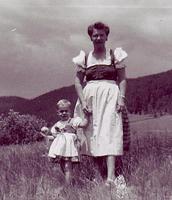 There were summer days so hot that the grass burned my bare feet. I ran to get from place to place, the grass burned so hot. We lived on a street that ended in the woods, and at Easter our folks got Chip and me a baby duck. A neighbor boy told me he had taken the duck down to a snake pit in the woods and it had been eaten up by the snakes. Who knows if that really happened, but it was my first experience with a bully.
There were summer days so hot that the grass burned my bare feet. I ran to get from place to place, the grass burned so hot. We lived on a street that ended in the woods, and at Easter our folks got Chip and me a baby duck. A neighbor boy told me he had taken the duck down to a snake pit in the woods and it had been eaten up by the snakes. Who knows if that really happened, but it was my first experience with a bully.Another day, I was playing on a swing set in a neighbor’s yard, and suddenly the sky begin to darken and there was thunder and lightning. The loud crack startled me so that I hit my chin on the cross-bar of the swing set and bit through part of my tongue. I remember running home bleeding and being so scared by what I had done.
Our family was never quick to embrace new technology, and we were not the first on our block to buy a television. My brother would go to a neighbors’ house to watch TV, but it was in Searcy that I remember we bought our first set. My dad would sit and I would stand between his legs, and we would conduct together the Lawrence Welk orchestra, the Champagne Music Makers.
Chip and I watched the Howdy-Doody show, and we actually had a little plastic Howdy-Doody doll the size of my hand whose mouth moved when you pushed on a little plastic lever in back of his head. I’m not sure what age I was when I fell in love with the Mickey Mouse Club and just had to have those white cowgirl boots with the tassles, so I could participate in Roundup Day. (Was it Tuesdays? They had a regular schedule where special programs landed on the same day every week.) I would stand in front of the TV and imitate the dance the girls did in their white boots.
I had a doll named Tiny Tears. You would feed her real water in a bottle, and it would come out her eyes as tears. I loved that doll. We were at some big event like a church potluck or a college program at Harding, and I accidentally left that doll behind. I must have put up a big fuss, because we drove back to look for it, couldn’t find it, and I somehow convinced my folks that I would not be consoled until they bought me another Tiny Tears just like her.
Another physical memory was holding both my mom’s and dad’s hands and being swung between them down some big church steps. I don’t know which church had those big, long steps, so I can’t be sure what age I was or which city I was in. I felt secure and happy when I was between them at church, or being swung like that. It was when my mom and I were alone that I started to be miserable.
In the Searcy house, I was three or four years old. I was sitting in our green chair with the ottoman, curled up and crying. My mom was just across the room talking cheerfully on the phone, and then she spoke kindly to our fluffy white dog, Snowball. I said, “Momma, how come you can talk so nice to other people and to Snowball, but you can’t talk nice to me?” This feeling of not being safe with her, and not being treated kindly by her, characterized our relationship until she died at 82. What a sad, difficult and mutually painful relationship we had.
In Searcy, we had several animals. Tweety-Bird was a yellow parakeet who lived in a cage in the bathroom. (Or do I remember the cage in the bathroom because it was being cleaned? I’m not sure.) We had the big white dog named Snowball. We had the ill-fated Easter duck for awhile. Most special of all, though, was that my dad decided to buy a horse. We boarded her in someone’s stable further out in the country. Her name was Big Red, and I must have ridden on her, but that part I don’t recall.
What I do remember was sitting on her back one day in her stall. Another horse was able to nibble at her tail from the next stall, and she got irritated and bucked. I flew off and landed in her feed trough, hitting my arm on the side. The doctor said I had a “green twig fracture” which he explained meant the bone did not break but fractured when it bent on the edge of the feed trough. So I’m only four years old and have already broken two appendages and a broken collar bone. Before we left Searcy, Big Red had a foal, and it broke my heart to say goodbye to them when Daddy told us we were leaving for California.
We packed the car, sold Big Red and her colt, gave away Tweety-Bird, but took Snowball with us. He sat on the floorboards under my feet. I remember that car, a dark green Chevy with running boards. I was still little enough to sit on the pull-down armrest, and I called it “my seat”. So we headed out on the long drive to California, across the desert, and at one point we stopped for gas. Gathering us back to the car, my dad called out to Snowball who had wandered across the highway. Obediently, he started back toward us and was hit by an eighteen-wheeler.
It was my first experience with death (The duck doesn’t count – we hadn’t bonded.), and I remember the shocked feeling that Snowball was no longer with us. The floorboards kept feeling so empty without him under my feet. I know my dad must have been terribly upset by what had happened, but all I remember feeling was the shocked numbness. I didn’t grieve by crying or being angry or talking about the loss. This was my pattern for many years afterward.
We went to Carlsbad Caverns on our way, and I can still feel the damp cold and the majestic hugeness of the cave system. I was scared when they turned out the lights and everything was blacker than I had ever felt. I think that’s all I know about the trip until we started to approach Los Angeles. It was night, and my dad woke Chip and me up to look at a new sight. It was a river of red lights going one way and white lights coming the other. He said, “You won’t see this anywhere else, children. This is called a freeway, and it’s only here in California that you can see this kind of sight for miles and miles.”

